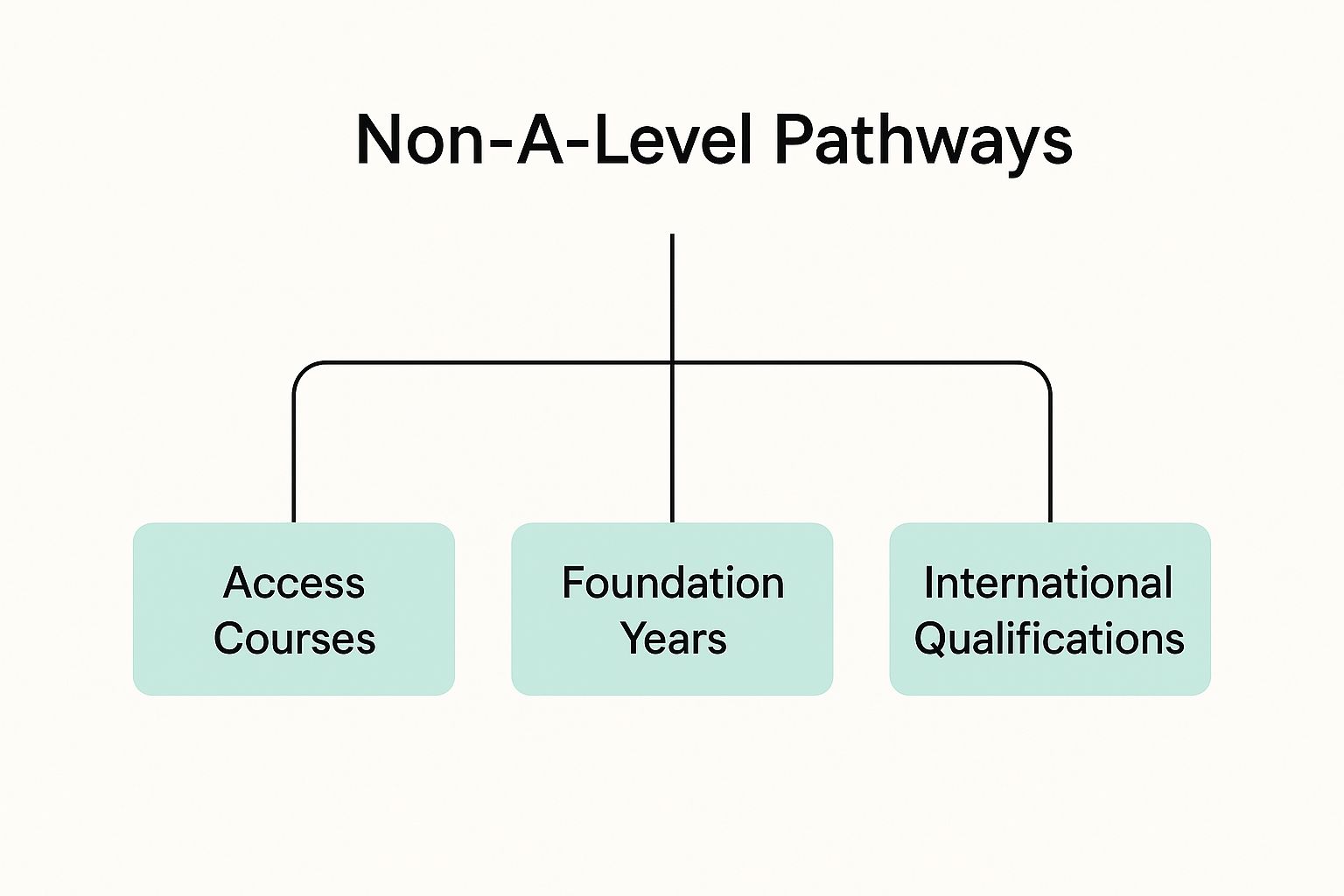
Let's get one thing straight right away: yes, you absolutely can go to uni without A Levels. It's a common myth that A Levels are the only way in, but the truth is, UK universities now welcome a huge range of qualifications and life experiences. If you thought that door was closed, this guide is here to show you how to open it.
Your Guide to University Without A Levels
Have you ever worried that you’ve missed your chance at a degree because you didn't follow the traditional school-to-A-Levels route? That couldn't be further from the truth. The world of university admissions has opened up, creating several proven pathways for determined students like you. The trick is simply figuring out which one is the right fit.
Every university sets its own entry requirements, and a growing number are actively looking for students with different kinds of Level 3 qualifications. This could be anything from vocational awards to specialised diplomas. Always check the specifics for your dream course by looking up university entry requirements on the UCAS website.
Understanding Your Options
Which path you take boils down to your background, what you want to study, and how you prefer to learn. There’s no single "best" alternative—just different options designed for different people.
This image gives you a quick snapshot of the main routes people take to get into university without A Levels.

As you can see, your journey to a degree can start from several different places, each one providing a solid bridge to higher education.
The Most Common Pathways
To help you get a clearer picture, let's look at the most popular and respected alternatives to A Levels for getting into university.
- Access to Higher Education (HE) Diplomas: These are tailor-made for adults who've been out of the classroom for a while and offer one of the most direct routes to a degree.
- Foundation Years: Think of this as a ‘Year 0’ offered by many universities. It’s designed to get you up to speed for their specific degree courses if you don't quite meet the standard entry criteria.
- BTECs and T Levels: Perfect if you're a hands-on learner. These vocational qualifications focus more on practical skills and coursework than traditional exams.
- Degree Apprenticeships: This is a game-changer. You get to earn a salary and gain real-world experience while studying for a full degree—often with no tuition fees to worry about.
The key thing to remember is that A Levels are not the be-all and end-all. Your ambition and a willingness to learn, combined with the right qualification, are what truly matter.
Alternative Pathways to University at a Glance
To make things even clearer, here’s a quick comparison table to help you see how these options stack up against each other.
| Pathway | Best For | Typical Duration | Learning Style |
|---|---|---|---|
| Access to HE Diploma | Adults returning to education after a break. | 9-12 months | Focussed academic study, often online. |
| Foundation Year | Students who need to bridge a knowledge gap for a specific degree. | 1 year (part of a 4-year degree) | University-based, a mix of lectures and seminars. |
| BTECs/T Levels | School leavers or young adults who prefer practical, hands-on learning. | 2 years | Coursework, projects, and work placements. |
| Degree Apprenticeships | Anyone wanting to earn while they learn and get a head start in their career. | 3-6 years | A blend of on-the-job training and part-time university study. |
Each of these pathways provides a structured and well-respected route to earning the UCAS points and skills you need for university. If you're keen to explore these in more detail, you might find our full guide on how to get to uni without A Levels really helpful.
Your Bridge to University: The Access to HE Diploma

Imagine a purpose-built bridge, designed to get you from where you are now, directly to the university course you've been dreaming of. That’s exactly what an Access to Higher Education (HE) Diploma is. It's one of the most popular routes for anyone hoping to go to uni without A Levels, particularly if you're an adult learner.
This qualification is specifically created for people who have been away from formal education. It’s an intense but rewarding course, typically completed in just nine months to a year, that gets you ready for the academic demands of a degree.
How Does an Access to HE Diploma Work?
The real genius of the Access to HE Diploma is its structure. You won’t be cramming for a couple of make-or-break exams. Instead, you build up your qualification by earning credits through coursework, assignments, and practical projects spread throughout the year.
This approach means you gradually create a solid portfolio of work that showcases your skills and understanding. When university admissions tutors see it, they get a clear picture of your consistent effort and academic potential.
An Access to HE Diploma gives you the chance to prove you’re ready for university, no matter your previous qualifications. It's a pathway that universities across the UK don't just recognise—they actively welcome.
In fact, many universities list the Access to HE Diploma as a standard entry requirement for applicants without A Levels. It's not uncommon for a top university to ask for the diploma with a specific number of credits at Merit or Distinction, showing just how much they value it.
What Can You Study and What Do You Need?
There's a massive range of Access to HE Diplomas available, covering almost any subject you can think of. This is brilliant because it means you can dive straight into the field you're passionate about and get a head start on your degree.
Some of the most popular subject areas include:
- Health and Social Care: The go-to pathway for degrees in nursing, midwifery, social work, and paramedicine.
- Science and Engineering: Sets you up perfectly for a future as a scientist, engineer, or tech expert.
- Humanities and Social Sciences: Your route into subjects like psychology, sociology, law, and history.
- Business and Management: A fantastic choice for anyone with their eye on a business-related degree.
The diploma you choose gives you the exact foundational knowledge you'll need to hit the ground running at university. For example, if you're drawn to a career in healthcare, you might want to read our guide on how to become a midwife without A Levels, which explains this pathway in more detail.
Generally, you don't need any A Levels to get started. Most courses will look for GCSEs in English and Maths at grade C/4 or above, or equivalent qualifications. This makes it a really accessible starting point for a lot of people.
Getting Hands-On with BTECs and T Levels
If you're the kind of person who learns best by doing rather than just reading and revising for exams, then a vocational qualification could be your perfect ticket to university. Courses like BTECs (Business and Technology Education Council) and the newer T Levels are all about practical skills and real-world knowledge. They’re a fantastic alternative if you want to go to uni without A Levels.
Instead of cramming for a few big exams, your grade is built on projects, coursework, and hands-on tasks throughout the course. Think of it like this: instead of writing an essay about how a bridge is built, you get to design one and test its weak points. It's this practical, applied way of learning that many universities really value.
What's the Deal with BTECs?
BTECs have been a solid, trusted route into higher education for years. They let you dive deep into a specific subject—whether it's Engineering, Media, or Health and Social Care—and you're assessed mostly on your coursework. This means you build up your final grade bit by bit, which takes the pressure off a single exam period.
Because they’ve been around for so long, BTECs are accepted by universities all over the UK. For instance, the University of Glasgow explains that BTEC National Diplomas can get you straight into a degree programme, sometimes without needing any A Levels at all. It’s well worth checking how different universities view these qualifications.
BTECs are a brilliant way to show consistent hard work and a genuine, practical grasp of your subject. That’s exactly what university admissions tutors want to see.
And What About the New T Levels?
T Levels are the new kids on the block. They mix classroom study with a serious amount of time in a real workplace. The whole course is designed alongside employers, making sure you’re learning the skills that companies are actually looking for.
A T Level is equivalent to three A Levels and comes with a mandatory work placement of at least 45 days. This is a huge bonus. When you apply to uni, you won’t just have a qualification; you’ll have proper, relevant work experience to talk about in your personal statement and interviews.
Let’s break down the difference:
- BTECs: Are heavily focused on coursework and practical projects you do at college, giving you a deep understanding of a single subject.
- T Levels: Combine 80% classroom learning with 20% on-the-job training, directly connecting what you study with a future career path.
Ultimately, whether you go for the deep-dive specialism of a BTEC or the industry-focused path of a T Level, both are excellent, hands-on ways to earn the UCAS points you need. They prove you’ve got the self-discipline and skills to do well at university.
Foundation Years vs. Foundation Degrees: What’s the Difference?

When you look into getting into uni without A Levels, you’ll see the word ‘foundation’ pop up everywhere. But be careful – it’s used for two very different routes: foundation years and foundation degrees. Knowing which is which is key to picking the right path for you.
Think of both as brilliant stepping stones. They're built for people who have the drive for university but might not have the specific grades or subjects needed to jump straight in. They bridge that gap, giving you the skills and confidence to not just get by, but to really succeed.
So, What's a Foundation Year?
A foundation year is best described as a 'Year 0' for a specific university degree. It’s an extra year bolted onto the beginning of a standard degree course, turning a three-year programme into a four-year one. It's run by the university you want to attend and is designed specifically to get you ready for their course.
You'll be on campus from day one, using the library, joining societies, and getting a feel for university life. The whole point is to bring you up to the right academic level so you can smoothly transition into the first year of your chosen degree. Pass Year 0, and you're automatically in.
The bottom line: A foundation year isn't a qualification you get separately. It’s the starting block of a full, four-year degree, all at one university.
And a Foundation Degree?
This is where things get different. A foundation degree is a qualification in its own right. It’s a very practical, hands-on course that’s equivalent to the first two years of a standard honours degree.
These courses are often designed in partnership with employers, so they’re laser-focused on giving you the skills needed for a particular industry. That makes them incredibly valuable for your career.
The big win here is flexibility. Once you finish your two-year foundation degree, you have choices. You can walk straight into the workplace with a respected Level 5 qualification under your belt. Or, you can do a one-year 'top-up' course at a university to convert it into a full Bachelor's (Honours) degree. It keeps your options wide open.
Foundation Year vs Foundation Degree: Key Differences
To help you see the difference at a glance, here’s a straightforward breakdown. Use this table to figure out which pathway aligns better with where you want to go.
| Feature | Foundation Year (Year 0) | Foundation Degree |
|---|---|---|
| What You Get | An integrated part of a full degree. | A standalone, work-focused qualification (Level 5). |
| Main Goal | Prepares you for a specific degree at one university. | Gives you vocational skills for a specific career path. |
| How Long It Takes | One year, which then leads into a three-year degree (4 years total). | Two years. You can add a third 'top-up' year for a full degree. |
| Flexibility | Less flexible. You're committed to one university and degree from the start. | Very flexible. Leads to work or a top-up degree at various universities. |
Ultimately, a foundation year is about getting onto a specific degree, while a foundation degree is about getting a qualification that gives you options for both work and further study.
Earn a Degree While You Work Through Apprenticeships
What if you could get a full university degree, earn a competitive salary, and finish with zero student debt? That’s exactly what higher and degree apprenticeships offer. This is a brilliant way you can go to uni without A Levels, blending a full-time job with part-time university study.
Think of it as being paid to learn. You’ll spend most of your week working for a company, getting priceless, hands-on experience in your chosen field. The rest of your time is spent studying for a degree with a partner university.
The best part? Your employer and the government cover your tuition fees. You graduate with a top qualification, years of professional experience on your CV, and no student loan hanging over your head.
This route gives you a serious head start. While your peers might be in full-time study, you’re already building a career, earning a good wage, and putting your new academic knowledge to the test in real-world situations.
How Do They Work and Who Are They For?
Apprenticeships come in several levels, but it's the higher apprenticeships (Level 4/5) and degree apprenticeships (Level 6/7) that lead to university-level qualifications. A Level 6 apprenticeship, for example, is the same as a full bachelor’s degree.
These opportunities aren't just for school leavers; they’re for anyone, including adults looking to switch careers. To get on one, you don't apply through UCAS. Instead, you apply directly for an apprenticeship vacancy with an employer.
You can find them in a massive range of industries, such as:
- Engineering and Manufacturing
- Digital and Technology Solutions
- Business and Finance
- Health and Social Care
- Law and Legal Services
Is an Apprenticeship Right for You?
Make no mistake, this path is tough. You'll be balancing a full-time job with the demands of degree-level study, so you need to be incredibly organised and self-motivated. The payoff, however, is huge.
This option truly stands out because it marries practical skills with academic theory, producing graduates that employers are desperate to hire. Just like an Access to HE Diploma, it's another respected route that can unlock your potential. To see how these different qualifications stack up, it's worth exploring whether you can go to university with an Access to Higher Education Diploma in our other guide.
How to Craft a Standout University Application

Your qualifications are what get you in the door, but it’s your application that truly tells admissions tutors who you are. When you want to go to uni without A Levels, this is your moment to stand out and convince them you’re the right person for their course.
A strong application isn't just a list of your achievements; it's a story. It’s where you connect the dots between your life experience, your qualifications, and where you want to go next.
Write a Personal Statement That Tells Your Story
The personal statement is the heart of your UCAS application. You need to explain why your experiences matter.
Did you work in a busy shop? Talk about the communication and problem-solving skills that taught you. If you’ve raised a family, that’s a masterclass in time management and resilience. These are the things that admissions tutors want to see. They’re looking for your passion and your potential, so use your unique journey as proof that you have the drive and maturity to thrive at university.
Your non-traditional path is not a disadvantage; it's your unique selling point. It shows resilience, determination, and a real-world perspective that many younger students simply don't have.
Translate Your Experience into Their Language
Think of yourself as a translator. Your job is to turn your practical skills into the kind of academic language that universities understand. Here’s how you can make your experience count:
- Work Experience: Instead of saying you "worked on a team," you could write, "collaborated with a diverse team to achieve shared project goals." It sounds more professional and specific.
- Alternative Courses: Don't just say you "did an Access course." Explain how specific modules directly prepared you for the challenges of degree-level study.
- Life Skills: "Managed a household budget" can be framed as "gained practical experience in financial planning and resource allocation."
Choosing the right person to give you a reference is also massively important. Pick someone who knows you in a professional or academic setting and can vouch for your work ethic and skills. This could be a former manager, a tutor from your Access course, or a supervisor from a volunteer role. A strong reference provides crucial, independent proof of what you're capable of.
Your University Pathway Questions Answered
Even after exploring all the different routes available, it’s normal to have a few questions buzzing around. Let's clear up some of the most common worries people have when thinking about going to uni without A Levels. Consider this your final confidence boost.
We’ll cover everything from how universities really feel about these alternative qualifications to the nitty-gritty of funding your studies. The goal is to make sure you feel ready for the path ahead.
How Do Universities Really View These Alternative Qualifications?
This is often the number one concern, but let me put your mind at ease. UK universities don't just accept qualifications like Access to HE Diplomas or BTECs; they genuinely value them. Admissions teams are smart—they know that students from these backgrounds are often incredibly motivated, mature, and determined to succeed.
Think about it: an Access to HE Diploma provides intense, focused preparation for a specific degree, sometimes even more so than A Levels. Your journey is seen as a strength, a testament to your commitment, not a drawback.
Can I Get Student Finance Without A Levels?
Yes, absolutely. If you're studying for a recognised qualification, like an Access to HE Diploma or a foundation year, you're typically eligible for the same student finance package as everyone else. This includes loans for your tuition fees and maintenance loans to help with your living costs.
The crucial thing to remember is that eligibility is tied to the course you’re taking, not the qualifications you have from the past. For degree apprenticeships, your employer and the government cover your tuition, so you won't need a loan for fees at all.
Is It Harder to Get a Place at a Top University?
Let's be realistic: getting into the most competitive universities and high-demand courses (like medicine or law at a Russell Group institution) is tough for everyone. The entry standards are incredibly high. However, it's far from impossible.
Many top-tier universities clearly list their entry requirements for students with BTECs or Access to HE Diplomas right on their websites. You'll almost certainly need to be aiming for top marks—Distinctions in most cases—but the door is open. The best advice is always to check the specific entry requirements for the exact course you're dreaming of.
Ready to find the perfect course to get you to university? At Stonebridge Associated Colleges, we specialise in flexible, online Access to Higher Education Diplomas designed to fit around your life. Explore your options and start your journey today by visiting https://www.stonebridge.uk.com.




